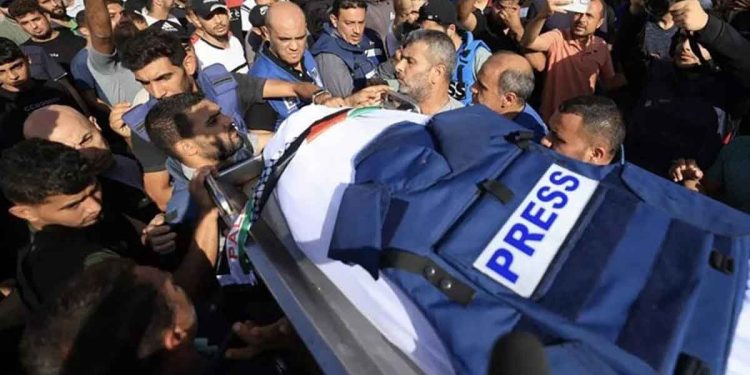Since the outbreak of the genocidal war on the Gaza Strip on 7 October 2023, Palestinian journalists have stood as the frontline defenders of truth. Yet, they have also become some of the primary victims of Israeli machinery of killing, having been deliberately and systematically targeted in a bid to silence the Palestinian voice and suppress documentation of atrocities.
Over the two years of ongoing war, Israeli occupation forces have killed 254 journalists, including 34 women, in what is considered one of the most horrific, systematic campaigns of media killings in modern history.
The year 2023 was the deadliest, with 102 journalists and media workers killed, followed by 91 in 2024, and 59 more from the beginning of 2025 until early October. Many of those victims were killed along with their families, either in their homes or in displacement shelters, including tents and facilities near hospitals.
The aggression has not stopped at killings alone. 153 journalists have been detained since the war began, 48 in 2023, 69 in 2024, and 36 so far in 2025. In addition, 255 journalists have been injured, some with life-altering injuries such as amputations or permanent disabilities.
More than 150 media offices and institutions have been destroyed since 2023, including 90 in the first year, 30 in 2024, and 20 so far in 2025. This is part of a clear campaign to dismantle the Palestinian media infrastructure and obstruct the delivery of truth from the ground.
The war on journalists has also extended into the digital sphere, with a sharp rise in online censorship and content removal on platforms such as Facebook, Instagram, YouTube, X (formerly Twitter), and TikTok. These actions are often coordinated with Israeli occupation authorities and are accompanied by cyber threats and systematic targeting of journalist accounts.
What is happening to Palestinian journalists constitutes a clear violation of international law, specifically the Rome Statute of the International Criminal Court, which criminalises the targeting of civilians and media institutions during conflicts. The systematic killing of journalists may also be classified as a form of partial genocide aimed at erasing Palestinian collective memory and preventing documentation of crimes against humanity.
Despite the scale and documentation of these grave violations, complete with names and visual evidence, the international community remains silent, in stark breach of its legal and moral duty to protect journalists and ensure accountability for those who commit crimes against them.


























